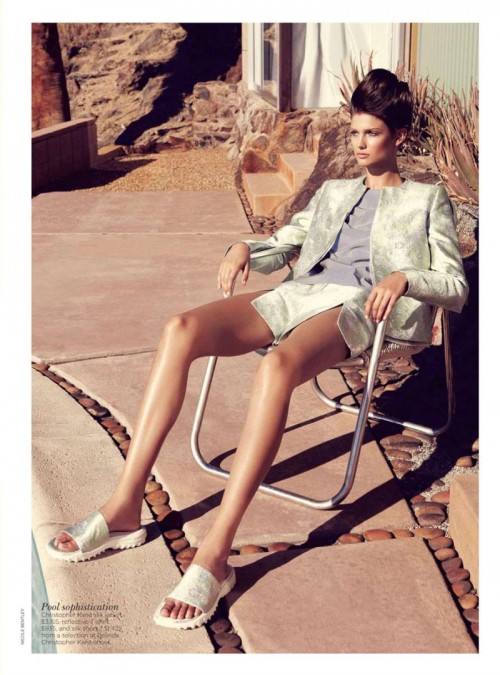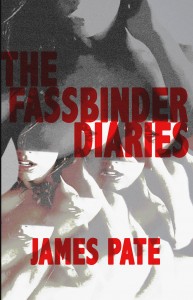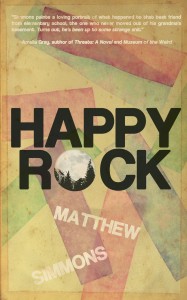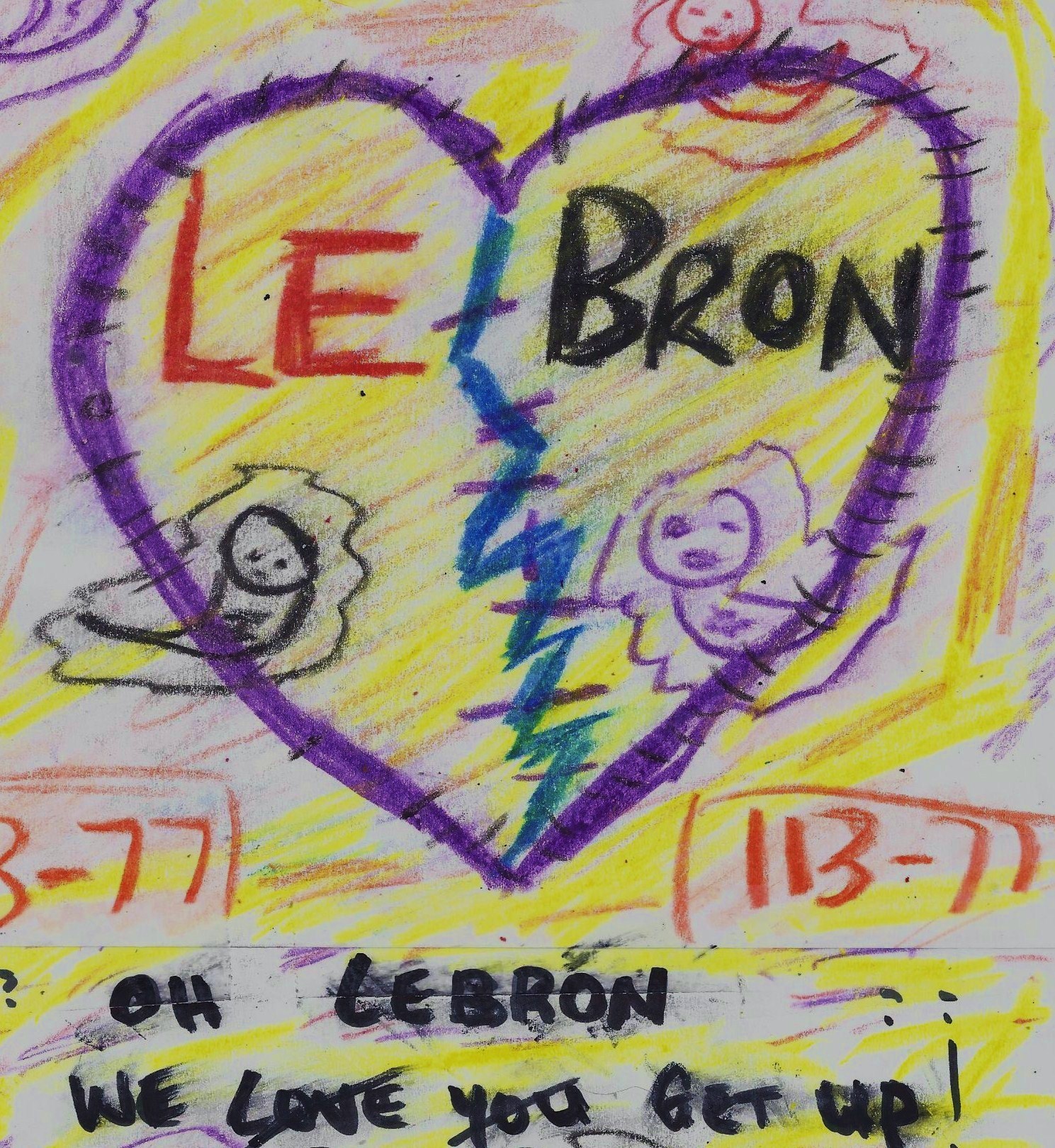“HIS LAST DAYS AS AN ARTIST”
“HIS LAST DAYS
AS AN ARTIST”
Slash Lovering
60 min
[2011, partial, unpublished bootleg – Erik Stinson, 2013]
Characters
CARL – male, 29
LINDA – female, 24
ROMAN – male, 29, work friend of Carl
SOPHIE – female, 22, a reveler
1 EXT Bushwick, Monday night, in the quiet of the early
work week, walking from the train, then INT at CARL’s
apartment.
The Books I Want to Read During the Summer
Much like Mary Tudor and Anne Boleyn, summer and I are the antithesis of amicable. I hate heat. I heat sweat. I hate seeing human skin. I hate swimming. I hate sunlight. All of these tasteless traits are allotted a starring role in June, July, and August. Already, I want winter to come. The cold, the frost, snow, booties, mittens! Winter is sort of more elaborate than summer. While I never want to be a part of this world, (and by this world, I mean you-know-whos with you-know-what values), I really don’t want to be a part of this world in the summer. Since Mary refused to recognize Anne as England’s queen, I’ll refuse to recognize summer. Instead, I’ll read books (one, obviously, should always read books, since it’s one of the utmost Christian activities), including:
FunSize&BiteSize by Ji Yoon Lee: She resembles a cute tiny kitty who everyone wants to pet, only no one actually does, since nearly everyone is aware that if you attempt to do such a thing then she’ll bite you, and while that bite may not hurt much at first, eventually it’ll turn into a disease much more fatal than the kind gay people get. A preview: “Fetishize my misery / Not white American male’s.”
I Will Never Be Beautiful Enough to Make Us Beautiful Together by Mira Gonzalez: She seems sad, depressed, moody, discontent, and all the other things that most anyone with any perceptiveness would be right now. She also has a rather captivating name. “Mira” is light and delicate, like a fine piece of fabric. “Gonzalez” is also the last name of the former Texas Ranger baseball player Juan Gonzalez. This All Star constantly hit home runs, which are quite dramatic. Preview: “i feel like 400 dead jellyfish in the middle of a freeway.”
Lemonworld & Other Poems by Carina Finn: She’s basically a modern princess (one of the poems in this book is titled “modern princess”) who has come home for winter break to visit her mommy and sigh flippantly and eloquently at the whole entire universe. Carina likes yummy food (browniemix), fashion accessories, like ribbons, violence (“peace is a field of graves”), and the types of things Gertrude Stein would like — “16-year-old girl looking to buy a moustache.” To spotlight her forceful mercuriality, Carina includes plentiful exclamation points, one of the most comely types of punctuation marks ever. A couplet: “don’t trump the mode / there’s a rabbit in the marshmallow!”
Pageant Rhymes by JonBenét Ramsey: Last summer, the cute Tumblr literary corporation Bambi Muse published Baby Adolf’s Nursery Rhymes to much acclaim. Even presumed adversities (presumed, due to a certain trait) were laudatory. “Nothing to complain ’bout here,” was Saul Bellow’s hearty response. This summer, Bambi Muse will publish a collection of couplets by the sensational JonBenét. The verse touches on yummy victuals, fashion, and other things. A couplet: “Cheddar broccoli soup is most profound. / I was killed in my pink Barbie nightgown.”
Taipei by Tao Lin: This boy, though a straight boy, seems like a manipulative psychopath, so I’m invariably curious about his compositions.
TwERk by Latasha N. Nevada Diggs: A little bit ago, Joyelle McSweeney posted about these poems. From what I’ve read, they contain the qualities of a circus as well as a loud, unmitigated drag ball. Even the author’s name teems with theatrics. Nevada is home to quite a few cinematic creations, like Casino (a mafia movie) and Liberace (a boy first and now a movie starring Michael Douglas and Matt Damon).
The Diary of Anne Frank by Anne Frank: I’ve read this book bountifully, obviously, and I will continue to do so during the summer months (and I’m not talking about the Sex and the City version either!) Caitlin Flanagan says Anne is an “imp, a brat, a narcissist, a sulker, a manipulator, a manic talker, a flirt, and a person who insisted on the rapt attention of everyone around her at one moment, and on the pure privacy that all misunderstood people demand at the next. ”
Petocha/Chiflada by Monica McClure: The sharply chic Mona is publishing a bratty chapbook with wtfislongsdrugspress, a new press founded by Carina and Stephanie Berger, the princess of The Poetry Festival. It’s invariably estimable when tiny, pretty girls work together on a particular project, it’s kind of like an episode of The Babysitters Club.
The Bible: A ton of people are on a path to hell, but by perusing this text (not just for summer, either) they just may be able to take the trail to heaven, where Edie Sedgwick and Edith Sitwell convene tea parties.
Melissa Chadburn’s SUMMER READS

What Melissa Chadburn is reading this summer:
***
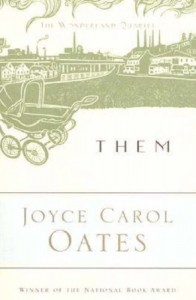 An oldie but goodie that I can’t wait to return to this summer:
An oldie but goodie that I can’t wait to return to this summer:
THEM by Joyce Carol Oates
Because it’s sprawling and epic and takes it’s time and the tone of it all feels like the hottest day I ever had in Shreveport Louisiana, where the bugs gave me blisters and time passed like molasses and sometimes you want books in summer to never end like that –it’s an infinity book
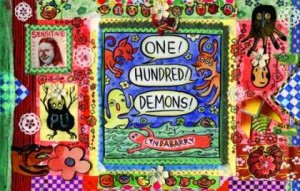 One that’s been out for awhile that I look forward to cracking open for the first time:
One that’s been out for awhile that I look forward to cracking open for the first time:
A HUNDRED DEMONS by Lynda Barry (Sasquatch Books, 2005)
Because I can’t believe I haven’t done it yet and because Lynda Barry makes me feel safe to be me and reminds me the why of it all—that it’s fun and life affirming and an act of love.
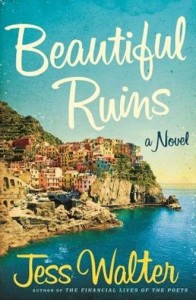 One I’ve read recently that is perfect perfect for the beach:
One I’ve read recently that is perfect perfect for the beach:
THE BEAUTIFUL RUINS by Jess Walter (Harper Perennial, 2013)
Because half the time you’ll marvel at the thing, how the hell is he doing this you’ll say with it’s mind bending structure with it’s POV twists and turns, it’s trans genreness. Then other times an honest passage like,
“This is a love story, Michael Deane says. But, really, what isn’t? Doesn’t the detective love the mystery, or the chase, or the nosy female reporter, who is even now being held against her wishes at an empty warehouse on the waterfront? Surely the serial murderer loves his victims, and the spy loves his gadgets or his country or the exotic counterspy. The ice trucker is torn between his love for ice and truck, and the competing chefs go crazy for scallops, and the pawnshop guys adore their junk, just as the Housewives live for catching glimpses of their own Botoxed brows in gilded hall mirrors, and the rocked-out dude on ‘roids totally wants to shred the ass of the tramp-tatted girl on Hookbook, and because this is reality, they are all in love—madly, truly—with the body mic clipped to their back buckle, and the producer casually suggesting just one more angle, one more Jell-O shot. And the robot loves his master, alien loves his saucer, Superman loves Lois, Lex, and Lana, Luke loves Leia (till he finds out she’s his sister), and the exorcist loves the demon even as he leaps out the window with it, in full sorrowful embrace, as Leo loves Kate and they both love the sinking ship, and the shark—God, the shark loves to eat, which is what the mafioso loves, too—eating and money and Paulie and omertia—the way the cowboy loves his horse, loves the corseted girl behind the piano bar, and sometimes loves the other cowboy, as the vampire loves night and neck, and the zombie—don’t even start with the zombie, sentimental fool; has anyone ever been more lovesick than a zombie, that pale, dull metaphor for love, all animal craving and lurching, outstretched arms, his very existence a sonnet about how much he wants those brains? This too is a love story. “
— these passages get you to throw down the microscope and pick up the mirror. Oh it’s me he’s talking to. Me. Me. Me. READ MORE >
June 14th, 2013 / 11:00 am
Could You Be With Her Now
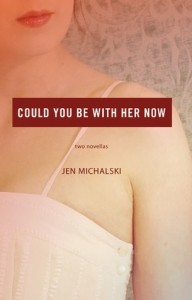 Could You Be With Her Now
Could You Be With Her Now
by Jen Michalski
Dzanc Books, 2013
180 pages / $15.95 Buy from Amazon or Dzanc Books
Stephen King called novellas an “ill-defined and disreputable literary banana republic.” In Jen Michalski’s Could You Be With Her Now, she gives us two very different samples of the republic. “May-September” is about a May-December romance and is lyrically written with a fascinating sensuality exploring relationships through the rhythms of music and stories. “I Can Make It To California Before It’s Time For Dinner” is about a mentally challenged fourteen-year-old who undertakes a haunting journey and is also a social commentary on the nature of entertainment when it intersects with reality. Together, they comprise a powerful one-two punch on the ecology of longing and desire, though it was the odyssey in “I Can Make It To California Before It’s Time For Dinner” that compelled me to write this review and what I’ll be focusing on.
In the novella, Jimmy, the mentally challenged boy who serves as narrator, can’t differentiate reality from TV. That’s why he thinks the actress on the screen, Megan, is his girlfriend. When his brother, Josh, challenges him to find her, he mistakes a local girl for the actress and accosts her. Throughout, the writing is deceptively simple, mimicking the tones of a young boy while blurring the boundaries between reality and illusion as we’re sucked into Jimmy’s world. “I pretend I’m a dinosaur eating people,” he says, and there’s a charm in the way he interprets experiences that are confusing to him through the prism of television and family anecdotes. The voice Michalski creates is funny and yet consistently unique in the way his view of the world is so fragmented. In some ways, when I initially read the description about the novella, I thought of Lenny from John Steinbeck’s Of Mice and Men. They are both beautifully written to fit the narrative and weave a haunting track of prose. But the parallels end quickly when Jimmy gets into a scuffle with the girl, and in a moment of panic, kills her, thinking merely that she’s gone to sleep. Again, the diction shows us that Jimmy is unaware of the gravity of what he’s done and he gets lost after his brother sends him away to hide from the police.
Jimmy wanders into a group of truckers at a gas station where he meets Ed. His only point of reference for strangers are cartoons. Ed is “short and fat like a Weeble and has a moustache like Yosemite Sam, but he is not a cartoon he is a real man.” In this case, entertainment gives him a false sense of comfort and when Ed offers to take him home out of concern, Jimmy goes along. But it becomes clear that taking him home is the furthest thing from Ed’s mind. The interactions between Ed and Jimmy start off innocently enough, but get brutally graphic and disturbing. Ed is a sexual predator, intending to exploit Jimmy. Jimmy, oblivious to the danger he’s in, explains his experiences with an innocence that makes every sentence difficult to read for everything that we have to read between the lines. Michalski constructs two layers of understanding to contrast Jimmy’s inability to understand what’s really going and the reality that the reader is forced to fill in between the gaps, resulting in an even more disturbing experience: “My legs are tired and they want to sleep and so do I. I am mad at Josh but when I get home I won’t hate him because he is my brother. God hears everything I say so I love Josh, love Josh, love Josh. Also, God, please I am lost and I need a telephone and a puppy for Christmas.”
June 14th, 2013 / 11:00 am
The Fassbinder Diaries
The Fassbinder Diaries by James Pate is now available. I had the pleasure of blurbing this (along with Johannes Göransson and Ken Baumann). The book contains many strange and beautiful pieces, including Pig Beach which you can read here. Pig Beach is one of my favorite contemporary poems In fact I like it so much I’ve mixed bits of it in to some of my readings:
The human sand pink and the pig wall burnt.
The beach light bright in the pig eye.
You can get The Fassbinder Diaries here
Present Tense and Mumbai New York Scranton by Tamara Shopsin
 I guess I’m never going to be a doctor of anything. I mean, I’ve only ever tried to become a doctor of creative writing, so I only feel a small amount of regret about the fact that I’ll never be a doctor. A doctor of creative writing is a strange sort of doctor to be, anyway. It’s maybe better not to be one, really.
I guess I’m never going to be a doctor of anything. I mean, I’ve only ever tried to become a doctor of creative writing, so I only feel a small amount of regret about the fact that I’ll never be a doctor. A doctor of creative writing is a strange sort of doctor to be, anyway. It’s maybe better not to be one, really.
One of the reasons I’m not going to be a doctor of creative writing is, I guess, that the application I sent to places for consideration for their doctoring in creative writing programs included a story that included a section written in the present tense. And this seemed to bother at least one someone enough for them to mention to me that it stuck out to them as a good reason not to bring me into their school to teach me all the things one gets taught when one works at becoming a doctor of creative writing. (I’m certain there are other reasons I will not be a doctor. But that was a reason a person copped to as a reason I was rejected as a creative writing doctor candidate. But, yeah. Many other reasons, I’m sure. I fall short in all sorts of ways. All the time. Ask anybody.) And in response to a query about my ineligibility to become a doctor of creative writing, I was sent a link to this 1987 essay by William Gass which he expresses dismay about all the present tense going around. “Why won’t you be a doctor? Here, read this and find out. William Gass will tell you.” READ MORE >
25 Points: The Drowned World
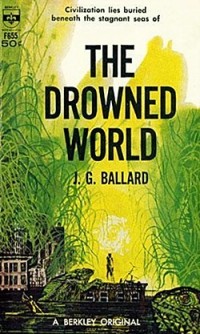 The Drowned World
The Drowned World
by J.G. Ballard
Berkley Books, 1962
208 pages / $23.95 buy from Amazon
1. “All the way down the creek, perched in the windows of the office blocks and department stores, the iguanas watched them go past, their hard frozen heads jerking stiffly. They launched themselves in the wake of the cutter, snapping at the insects dislodged from the air-weed and rotting logs, then swam through the windows and clambered up the staircases to their former vantage-points, piled three deep across each other.”
2. Freak extreme sunspot activity melts the polar ice-caps and reshapes the geography of earth. Humanity has migrated to the far north, and the cities of Europe are transformed into lagoons festering with lizards, mould, and ancient plant life. It’s the Triassic, part two.
3. The action focuses on two male biologists cataloguing new species in the lagoon that was once London, and a marooned heiress living in a half-flooded luxury apartment building. The biologists arrive with a military expedition charting the tributaries of the lagoon and surrounding islands. Despite the setting, it’s a boring premise, and it’s a relief when the main body of the expedition returns north.
4. Before the expedition leaves nearly everyone in the lagoon has started to dream about
a pulsing drum beat and “prehistoric sun”, which the biologists determine is a part of
“repressed” primordial memory, dating back to humankind’s earliest verterbrate
ancestors. #is is the main idea of the book. When I %rst got to this part I rolled my
eyes because it’s exactly that idea of “repressed primal drives” that I would expect was
trendy in the 60s and 70s (!e Drowned World was released in 1962). It reminded me
of the movie Wake In Fright, released in 1971, in which a prissy Australian schoolteacher
loses all of his money and basically gets his ass kicked by the Outback.
5. More things the idea of “repressed primal drives” reminded me of: “bogus ‘tribal’ art,”
“shag carpet,” “puma musk,” “gold medallions,” “whiskey,” “leopard print,” “snake
leather,” “open button-up shirts,” “Don Johnson’s alligator in Miami Vice,” “doing a lot
of cocaine,” “desperate misogyny.”
6. In Wake in Fright, the protagonist survives solely on the hospitality of strangers who
get him shitfaced and expect him to fire rifles while shitfaced. The movie is about a lot
of things, and it would be reductive to say otherwise, but contained within its premise
is the idea that there is a monstrous primal animal heart beating in the centre of
everyone. Wake in Fright handles this idea much better than The Drowned World: it’s
far more subtle, for one thing, which I think is partly due to the fact that it’s not
science fiction, although aside from its setting The Drowned World is not particularly
wild or exaggerated. And the Outback in Wake in Fright could almost pass for the
setting of a science fiction movie.
7. Wake in Fright’s excess is the result of despair or boredom whereas in The Drowned
World it is seen as a release or panacea.
8. As a title, !e Drowned World is almost too accurate, ultra-descriptive and relatively
bland, and the text doesn’t really exceed or challenge or stretch its boundaries. I don’t
think a work of fiction has ever delivered as well as The Drowned World does on the
implicit promises its title makes, and yet I’ve never been quite so disappointed. For a
post-apocalyptic wasteland, this was fairly standard fare, except perhaps for sections
like the passage I quoted in the first point.
9. “Drowned world,” “subconscious memories,” I get it, still boring.
10.Science fiction is, of course, always a better indicator of the time in which it is written
than that time’s future, but this book was too often derailed by its insistence on
remaining inside 1960s moral and social codes, as well as that time’s prejudices. This is
the main problem with The Drowned World. READ MORE >
June 13th, 2013 / 12:25 pm
Kevin Killian’s SUMMER READS
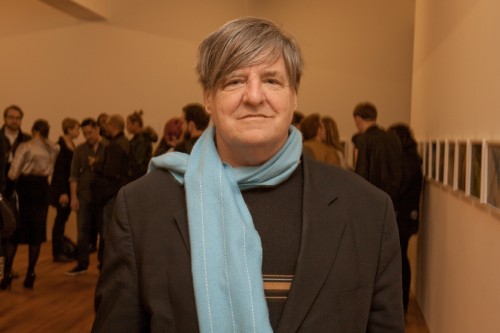
Photo Credit: Daniel Nicoletta
Kevin Killan’s summer reading picks:
***
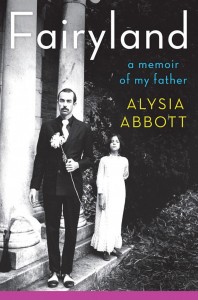 While waiting for Dodie Bellamy’s Cunt Norton to appear from Les Figues later on this summer, I’ll recommend a few books I know are already out. Fairyland, by Alysia Abbott (Norton) is the memoir of a young woman who grew up in the Haight-Ashbury, the only child of a single gay dad, and what happens when AIDS comes in to blow up her fragile world once again. Steve Abbott was a talented poet, thinker, novelist—and the man who coined the expression “New Narrative,”—one of my very first friends here in San Francisco. He’d be proud of the way his beloved and beautiful daughter has returned him to the world he left.
While waiting for Dodie Bellamy’s Cunt Norton to appear from Les Figues later on this summer, I’ll recommend a few books I know are already out. Fairyland, by Alysia Abbott (Norton) is the memoir of a young woman who grew up in the Haight-Ashbury, the only child of a single gay dad, and what happens when AIDS comes in to blow up her fragile world once again. Steve Abbott was a talented poet, thinker, novelist—and the man who coined the expression “New Narrative,”—one of my very first friends here in San Francisco. He’d be proud of the way his beloved and beautiful daughter has returned him to the world he left.
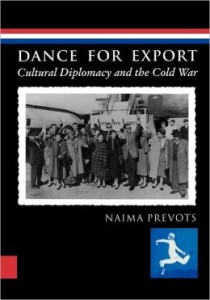 I’ve been reading Dance for Export: Cultural Diplomacy and the Cold War with much pleasure this weekend and last. In recent years I’ve come to understand generally that the Cold War of my youth impacted just about everything in culture too, as well as ideology, and that the US government secretly poured zillions of dollars into a propaganda game against the Russians to convince the world that, say, US abstract art was better than old-fashioned social realism. Naima Prevotz’ dance history brings us unto the Betlway and Manhattan boardrooms where specialized panels met to debate which US dance troupes were worthy of international exposure (Martha Graham, Jose Limon), and which were too avant-garde (Alwin Nikolais) or too politically suspect (Katherine Dunham). In general the US has always been eager to show the rest of the world what nice guys we are, and what great artists, and you know, for years I believed it. Now I see it’s all been a charade of spy vs spy, money vs. money.
I’ve been reading Dance for Export: Cultural Diplomacy and the Cold War with much pleasure this weekend and last. In recent years I’ve come to understand generally that the Cold War of my youth impacted just about everything in culture too, as well as ideology, and that the US government secretly poured zillions of dollars into a propaganda game against the Russians to convince the world that, say, US abstract art was better than old-fashioned social realism. Naima Prevotz’ dance history brings us unto the Betlway and Manhattan boardrooms where specialized panels met to debate which US dance troupes were worthy of international exposure (Martha Graham, Jose Limon), and which were too avant-garde (Alwin Nikolais) or too politically suspect (Katherine Dunham). In general the US has always been eager to show the rest of the world what nice guys we are, and what great artists, and you know, for years I believed it. Now I see it’s all been a charade of spy vs spy, money vs. money.
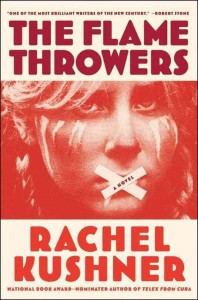 Some of this general background plays out in Rachel Kushner’s new novel The Flame Throwers—a book that needs no introduction from me but a stunning one nevertheless. I’m one who loved Telex from Cuba and have resented the years that have limped on by while I’ve been slavering for a new Kushner novel! Now here it is and I’m still in awe. Her novel of a woman driven by speed and curiosity to flout transnational borders in the service of avant-garde art reminds me so much of one of my old favorites, Joan Didion’s Play It As It Lays. But it’s as if there where a Joan Didion who knew about art instead of finding it, like all modern practices, ridiculous and appalling.
Some of this general background plays out in Rachel Kushner’s new novel The Flame Throwers—a book that needs no introduction from me but a stunning one nevertheless. I’m one who loved Telex from Cuba and have resented the years that have limped on by while I’ve been slavering for a new Kushner novel! Now here it is and I’m still in awe. Her novel of a woman driven by speed and curiosity to flout transnational borders in the service of avant-garde art reminds me so much of one of my old favorites, Joan Didion’s Play It As It Lays. But it’s as if there where a Joan Didion who knew about art instead of finding it, like all modern practices, ridiculous and appalling.
June 13th, 2013 / 11:05 am
5 Points: Happy Rock
— do you like Mothers exploding?
— hopeful suicides?
He produced a rope of fake pearls. They cinched them under her breasts, coiled them around her neck.
Marie said: “This seems wrong, though. I don’t like being tied.”
Eugene agreed, and they never used the pearls around neck or over her wrists, or around her ankles again.
***
. . .Eugene barely hears the phone ring. But it rings. On the roof, Eugene is laying down sod. He lays it over the shingles. He has a bucket of worms. He lays down the sod and sprinkles it with worms.
— Blood dried in a Rush groove? (just a drop. a single rose drop)
— Smashed-up windows falling like snow & crunched underfoot (the highlight of yr life)?
you can order Happy Rock here
O, Lebron
********************
I know it hurts, dude, but let me tell you about this puffball sitting in white sunlight in the middle of nowhere. And I inject this puffball into your neck, balls and butt. And you fall on to your hands and knees. And you’re soft and suave as a Pomeranian barking up philosophies, experiences, Robert Hass’s silkiest poems (and I wish I’d rescued you from a fairy tale). And you don’t stop.
********************
I am, though, standing in front of the mirror. And I’m holding a bowling bowl. And I smash my face with it. . . And I am you, LeBron James (blah, blah). . . And I haven’t written a sonnet in a thousand years (blah, blah). . .Pigs are buried, dancing, in every second. . .Blood lashed on the hardwood. READ MORE >

